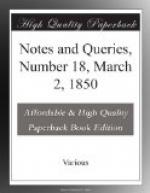[Footnote 1: In vol. iii. of the same work is another paper by the same author, entitled, “Conjectures respecting the Origin of Alphabetic writing,” pp. 365-384. Reference to these papers is principally made, not on the ground of any assumed merit, but because all that has been written on any given subject ought, if possible, to be brought before the minds of those engaged in the prosecution of the inquiry.]
Arabic Numerals.—If you think the following {281} title will do for your correspondent “E.V.” (No. 15. p. 230.), please to communicate it to him:
“Mannert, K., de Numerorum,
quos arabicos voc., vera origine
pythagorico; e. Fig.
aen. 8vo. Nuernberg, 1801.”
Oscar Heun.
Cambridge, Feb. 11. 1850.
Arabic Numerals (No. 15. p. 230.).—Your correspondent should consult Peacock’s “History of Arithmetic” in the Encyclopaedia Metropolitana; and, if he can get them, the notes to Chasles’ Apercu Historique des Methodes en Geometric, and various papers of Mr. Chasles, published in the Comptes Rendus of the French Institute. He may perhaps find some information in De Morgan’s Arithmetical Books, particularly at p. 14.
M.
* * * * *
THE FRATERNITY OF CHRISTIAN DOCTRINE—CHAUCER’S NIGHT CHARM.
In a little work by Costanzi, entitled Le Istituzioni di Pieta che si esercitano in Roma, &c., and published A.D. 1825, in Rome, where the schools under the management of that brotherhood are in great favour, “C.F.S.” will find much to interest him on the subject, though not exactly in the order in which he has put his queries (No. 14. p. 214.), nor to their full extent.
Mr. Thoms, to whom English mediaeval literature is so much beholden, asks very earnestly for some information about “the white Paternoster” and “seynte Petres soster,” (No. 15. p. 229.). Perhaps the following guesses may not be without use. First, then, about the “white Paternoster:”
Henry Parker, a Carmelite friar of Doncaster, who wrote his admirable Compendiouse Treatyse, or Dialogue of Dives and Pauper, during the reign of Edward IV., speaking against superstitions, and especially “craftes and conjurations with holy prayers,” says:
“They that use holy wordes of the gospel, Pater noster, Ave, or Crede, or holy prayers in theyr wytchecraftes, for charmes or conjurations—they make a full hye sacrifice to the fende. It hath oft ben knowen, that wytches, with sayenge of their Pater noster and droppynge of the holy candell in a man’s steppes that they hated, hath done his fete rotton of. Dr. What should the Pater noster, and the holy candell do therto? Pau. Ryght nought. But for the wytche worshyppeth the fende so highly with the holy prayers, and with the holy candell, and used suche holy thinges in despyte of God therefore is the fende redy to




